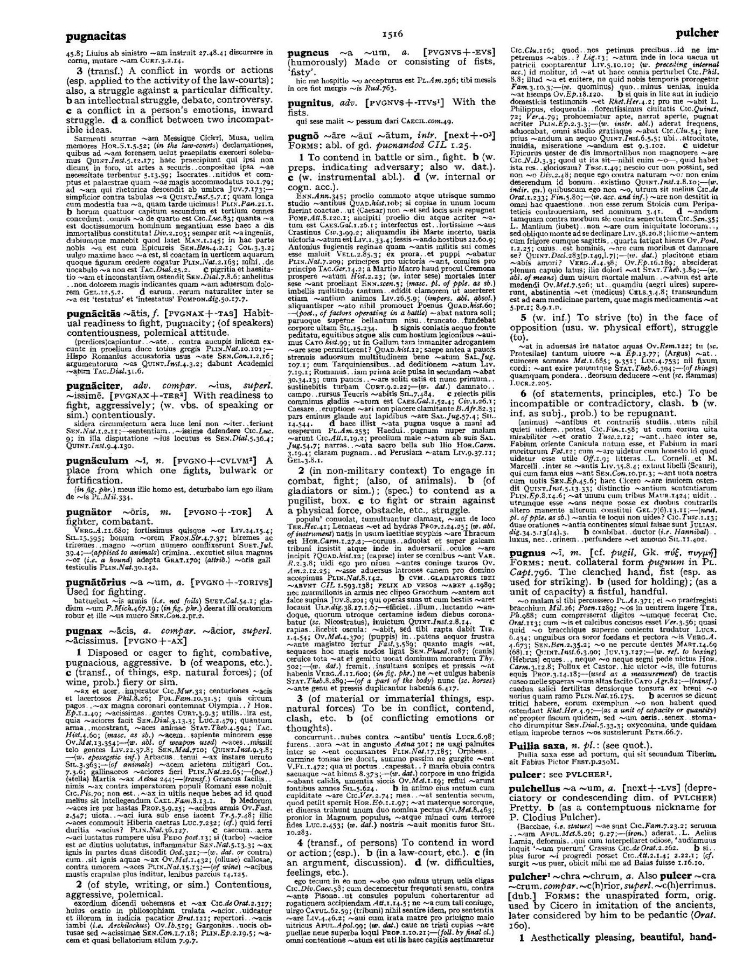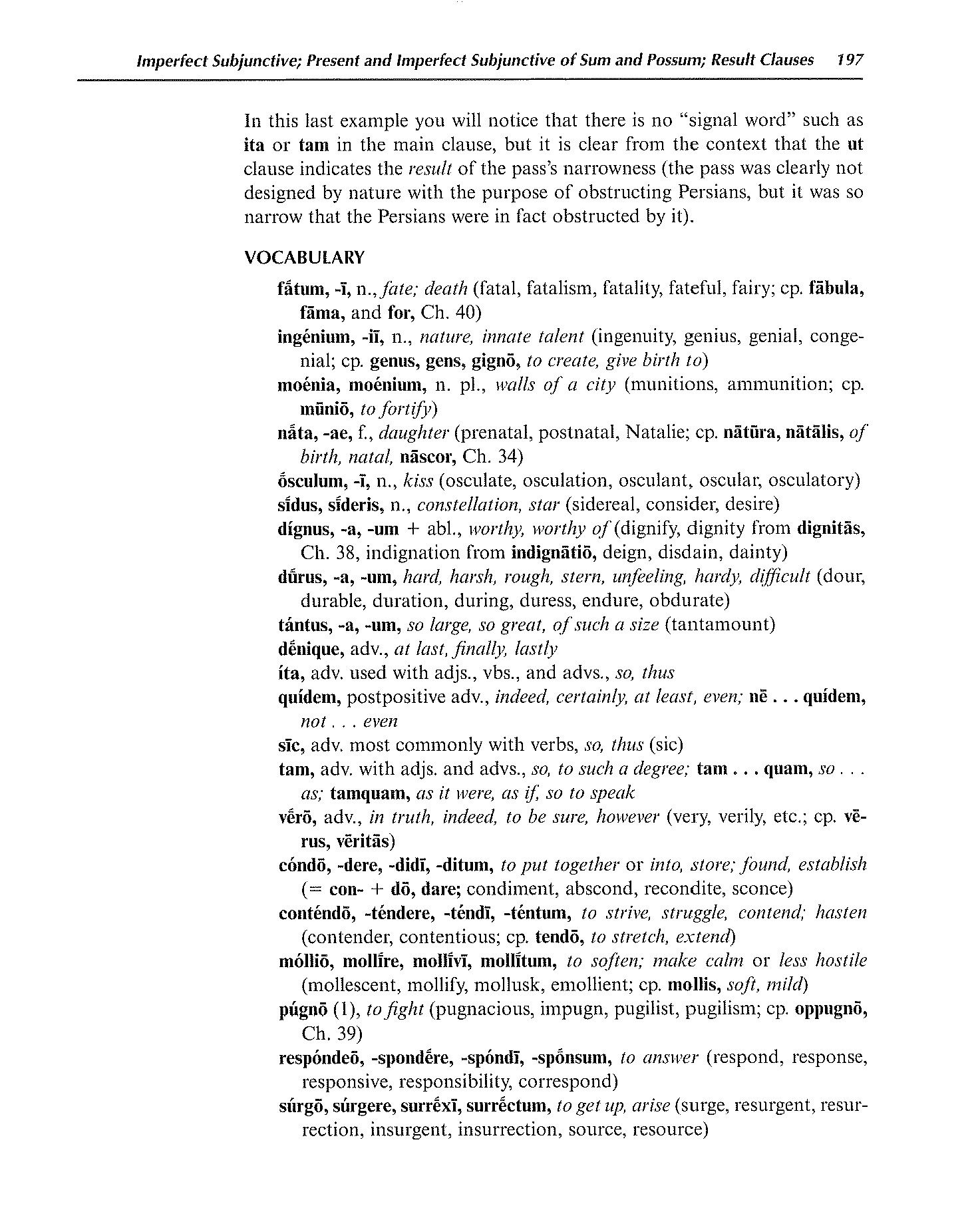
page_listing.tpl
page_subListingDetails.tpl
sub_listingDetails_style1.tpl
sub_listingDetails.title.tpl
pūgnāre to fight
pūgnāre is a Latin Verb that primarily means to fight.
Definitions for pūgnāre
Wheelock's Latin
Verb
- 1
to fight
English derivatives:
pugnacious impugn pugilist pugilism
Oxford Latin Dictionary
Verb
- 1
To contend in battle or sim., fight. (b) (w. preps. indicating adversary; also w. dat.). (c) (w. instrumental abl.). (d) (w. internal or cogn.acc.).
- 2
(in non-military context) To engage in combat, fight; (also of animals). (b) (of gladiators or sim.); (spec.) to contend as a pugilist, box. (c) to fight or strain against a physical force, obstacle, etc., struggle.
- 3
(of material or immaterial things, esp. natural forces) To be in conflict, contend, clash, etc. (b) (of conflicting emotions or thoughts).
- 4
(transf., of persons) To contend in word or action; (esp.). (b) (in a law-court, etc.). (c) (in an argument, discussion). (d) (w. difficulties, feelings, etc.).
- 5
(w. inf.) To strive (to) in the face of opposition (usu. w. physical effort), struggle (to).
Sentences with pūgnāre
Latin to English
Caesar, contrā Pompeium pugnātūrus, cōpiās parāvit.Compare Caesar, about to fight against Pompey, prepared his troops.
Militibus persuāsum est ut contrā hostēs pugnārent.Compare The soldiers were persuaded to fight against the enemy.
Tu miles tuus oro, ut ego pugno copia facio.Compare We, your soldiers, beseech you to give us an opportunity of fighting.
Diu quum pugno, nosterque graviter a multitudo premo, consumptus omnis telum, impetus in cohors facio.Compare When the battle had lasted (when it had been fought) a long time, and our men were being hard pressed by numbers, all their missiles being spent, they charge the cohorts.
Uni se atque eidem studio omnes dedere et arti—verba dare ut caute possint, pugnare dolose, blanditia certare, bonum simulare virum se, insidias facere ut si hostes sint omnibus omnes.Compare They are all up to the same tricks, engaged in the same business; cheating each other cleverly, battling treacherously, outdoing one another in flattery, posing as respectable citizens, laying traps for each other—all of then acting as though each were the other's mortal enemy.
Conjugation table for pūgnāre
Cactus2000
| ACTIVE | |
| Indicative present | Indicative imperfect |
| pūgnō pūgnās pūgnat pūgnāmus pūgnātis pūgnant | pūgnābam pūgnābās pūgnābat pūgnābāmus pūgnābātis pūgnābant |
| Indicative perfect | Indicative pluperfect |
| pūgnāvī pūgnāvistī pūgnāvit pūgnāvimus pūgnāvistis pūgnāvērunt / pūgnāvēre | pūgnāveram pūgnāverās pūgnāverat pūgnāverāmus pūgnāverātis pūgnāverant |
| Indicative future | Indicative future perfect |
| pūgnābō pūgnābis pūgnābit pūgnābimus pūgnābitis pūgnābunt | pūgnāverō pūgnāveris pūgnāverit pūgnāverimus pūgnāveritis pūgnāverint |
| Subjunctive present | Subjunctive imperfect |
| pūgnem pūgnēs pūgnet pūgnēmus pūgnētis pūgnent | pūgnārem pūgnārēs pūgnāret pūgnārēmus pūgnārētis pūgnārent |
| Subjunctive perfect | Subjunctive pluperfect |
| pūgnāverim pūgnāveris pūgnāverit pūgnāverimus pūgnāveritis pūgnāverint | pūgnāvissem pūgnāvissēs pūgnāvisset pūgnāvissēmus pūgnāvissētis pūgnāvissent |
Infinitive present pūgnāre Infinitive perfect pūgnāvisse Infinitive future pūgnātūrum esse | Imperative present pūgnā pūgnāte Imperative future pūgnātō pūgnātō pūgnātōte pūgnantō |
| PASSIVE | |
| Indicative present | Indicative imperfect |
| pūgnor pūgnāris pūgnātur pūgnāmur pūgnāminī pūgnantur | pūgnābar pūgnābāris / pūgnābāre pūgnābātur pūgnābāmur pūgnābāminī pūgnābantur |
| Indicative perfect | Indicative pluperfect |
| pūgnātus sum pūgnātus es pūgnātus est pūgnātī sumus pūgnātī estis pūgnātī sunt | pūgnātus eram pūgnātus erās pūgnātus erat pūgnātī erāmus pūgnātī erātis pūgnātī erant |
| Indicative future | Indicative future perfect |
| pūgnābor pūgnāberis / pūgnābere pūgnābitur pūgnābimur pūgnābiminī pūgnābuntur | pūgnātus erō pūgnātus eris pūgnātus erit pūgnātī erimus pūgnātī eritis pūgnātī erunt |
| Subjunctive present | Subjunctive imperfect |
| pūgner pūgnēris / pūgnēre pūgnētur pūgnēmur pūgnēminī pūgnentur | pūgnārer pūgnārēris / pūgnārēre pūgnārētur pūgnārēmur pūgnārēminī pūgnārentur |
| Subjunctive perfect | Subjunctive pluperfect |
| pūgnātus sim pūgnātus sīs pūgnātus sit pūgnātī sīmus pūgnātī sītis pūgnātī sint | pūgnātus essem pūgnātus essēs pūgnātus esset pūgnātī essēmus pūgnātī essētis pūgnātī essent |
Infinitive present pūgnārī Infinitive perfect pūgnātum esse Infinitive future pūgnātum īrī | Imperative present pūgnāre pūgnāminī Imperative future pūgnātor pūgnātor - pūgnāntor |
| PARTICIPLE | ||
| Participle present active | ||
| Nom. | pūgnāns | pūgnantēs |
| Gen. | pūgnantis | pūgnantium |
| Dat. | pūgnantī | pūgnantibus |
| Acc. | pūgnantem | pūgnantēs |
| Abl. | pūgnante | pūgnantibus |
| Participle future active | ||
| Nom. | pūgnātūrus | pūgnātūrī |
| Gen. | pūgnātūrī | pūgnātūrōrum |
| Dat. | pūgnātūrō | pūgnātūrīs |
| Acc. | pūgnātūrum | pūgnātūrōs |
| Abl. | pūgnātūrō | pūgnātūrīs |
| Participle perfect passive | ||
| Nom. | pūgnātus | pūgnātī |
| Gen. | pūgnātī | pūgnātōrum |
| Dat. | pūgnātō | pūgnātīs |
| Acc. | pūgnātum | pūgnātōs |
| Abl. | pūgnātō | pūgnātīs |
| Gerundive | ||
| Nom. | pūgnandus | pūgnandī |
| Gen. | pūgnandī | pūgnandōrum |
| Dat. | pūgnandō | pūgnandīs |
| Acc. | pūgnandum | pūgnandōs |
| Abl. | pūgnandō | pūgnandīs |
| Gerund | Supine | |
| Nom. | pūgnāre | pūgnātum |
| Gen. | pūgnandī | pūgnātū |
| Dat. | pūgnandō | |
| Acc. | pūgnandum | |
| Abl. | pūgnandō | |
Data sources
Notes
- Definitions
- Frederick M. Wheelock, Wheelock's Latin, 6th ed., rev. Richard A. LaFleur (New York, NY: HarperCollins Publishers, 2005): 197.
- P. G. W. Glare, Oxford Latin Dictionary, Vols. 1-8 (Oxford: Clarendon Press, 1982): 1516.
- Word frequencies
- Christopher Francese, "Latin Core Vocabulary," Dickinson College Commentaries, last modified 2014, http://dcc.dickinson.edu.
- Paul B. Diederich, The Frequency of Latin Words and Their Endings, PhD diss., (Columbia University, 1939).
- Louis Delatte, Suzanne Govaerts, Joseph Denooz, and Etienne Evrard, Dictionnaire fréquentiel et index inverse de la langue latine [Frequency Dictionary and Inverse Index of the Latin Language] (Liège, Belgium: Laboratoire d'analyse statistique des langues anciennes de l'Université de Liège [L.A.S.L.A.], 1981): 123.
Bibliography
Allen, Joseph H. Allen and Greenough's New Latin Grammar for Schools and Colleges: Founded on Comparative Grammar. Edited by James B. Greenough, George L. Kittredge, Albert A. Howard, and Benjamin L. D'Ooge. Boston, MA: Ginn & Company, 1903.
Crystal, David. A Dictionary of Linguistics and Phonetics. 6th ed. Oxford, UK: Blackwell Publishing, 2008.
Delatte, Louis, Suzanne Govaerts, Joseph Denooz, and Etienne Evrard. Dictionnaire fréquentiel et index inverse de la langue latine [Frequency Dictionary and Inverse Index of the Latin Language]. Liège, Belgium: Laboratoire d'analyse statistique des langues anciennes de l'Université de Liège (L.A.S.L.A.), 1981.
Diederich, Paul B. The Frequency of Latin Words and Their Endings. PhD diss., Columbia University, 1939.
Francese, Christopher. "Latin Core Vocabulary." Dickinson College Commentaries. Last modified 2014. http://dcc.dickinson.edu/latin-vocabulary-list.
Gildersleeve, Basil L., and Gonzales Lodge. Gildersleeve's Latin Grammar: Third Edition, Revised, and Enlarged. 3rd ed. London, England: Macmillan and Co., 1903.
Glare, Peter G.W. Oxford Latin Dictionary. Vols. 1-8. Oxford, England: Clarendon Press, 1982.
Krüger, Bernd. "Latin Conjugation Tables." Cactus2000. Accessed May 5, 2023. https://latin.cactus2000.de/index.en.php.
Pierson, Nick. "Sound of Text." Accessed October 26, 2019. https://soundoftext.com.
Wheelock, Frederick M. Wheelock's Latin. 6th ed. Revised by Richard A. LaFleur. New York, NY: HarperCollins Publishers, 2005.
Wiktionary Contributors. "Victionarium." Wikimedia Foundation, Inc. Updated March 18, 2019. https://la.wiktionary.org/wiki/Victionarium:Pagina_prima.
Citation
Chicago (17th ed.)
Allo Contributors. "pūgnō, pūgnāre, pūgnāvī, pūgnātum (v.) - Latin Word Definition." Allo Latin Dictionary. Last modified . Accessed January 30, 2026. http://ancientlanguages.org/latin/dictionary/pugno-pugnare-pugnavi-pugnatum.
Entry created on . Last updated on .







